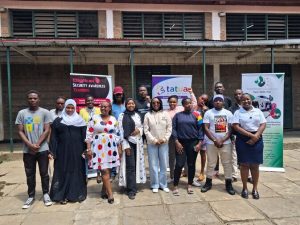Good points Beryl
Best regards
Barrack Otieno
On Friday, 25-10-2019 at 16:04 Beryl Aidi via kictanet wrote:
Dear listersComing in a bit late to this discussion, and largely as a
silent observer, I hope my observations are not too late.
My view is that the licensing and registration requirements are ways
to muzzle the public, prevent people from expressing themselves
freely; largely with an aim to keep criticism of leaders at bay and
ultimately an attempt to clampdown on the rights and freedoms
guaranteed in Articles 31-37 of the C on freedom of expression, access
to information, press freedom, freedom of assembly (in terms of groups
etc), freedom of association.
1. Narrow definition of what a blog is, confusing it with
news, when the universal definition of a blog is a weblog or a log of
written material posted on a website.
2. It leaves out platforms like Twitter which is
considered microblogging, which is vague and can easily land one in
problems.
3. License to social media platforms to operate in Kenya-
What does this mean? Is it the companies or is it about individuals
using the platforms? And how practical is this?
a. If it is about the companies what obligations are there
besides paying a license fee? If it is about raising revenues then
perhaps should a debate on taxing the companies be.
Or will we end up with alternatives that create a China wall like
China’s alternatives such as Baidu for Google, Sina Weibo for
Twitter or WeChat for Facebook?
b. If it is about users, will individuals now be required
to get a license to use social media? Do people now have to get a
permit to talk to and connect with family and friends or to express
themselves publicly?
3. Registration of bloggers- let’s say that blogging is
like letters to the editor or opinion pieces in a paper. Do people
register to share their opinion?
4. What about data retention? Is this going to be like Tanzania’s case
where cybercafe operators are now required to retain data in their
servers for a year? Where does that leave the right to privacy?
Al in all, it is a shame for Kenya to be replicating the worst
practices of its repressive neighbours when it has been the leader in
the the region.
Best
Beryl Aidi
On Fri, Oct 25, 2019 at 10:32 AM tevin mwenda via kictanet wrote:
Hi Kanini and all of the listers
I think the underlying issues here is a lack of knowledge from our
leaders on how social media works and the benefits it has on society.
It seems more on an attempt by them to settle personal scores and
particularly as it now appears they are all on the 2022 train am
seeing some mischief here.
This is also perhaps best seen in the recent article that I wrote
regarding how public figures use social media and their blocking
sprees. https://www.kictanet.or.ke/?p=40802
Maybe it has downed on them that you can not do this everytime someone
disagrees with you thus the need to come up with more elaborate ways
like this social media regulations.
I think their is need of institutions like Kenya School of Government
to conduct trainings to our leaders regarding social media and just
technology in general.
On Thu, 24 Oct 2019, 23:31 Twahir Hussein Kassim via kictanet, wrote:
Barrack 🙂
I like the way you quoted PLO (The Shakespear of our times… no pun
intended)
However, I think the analogy of mosquito being referenced on the
legislators noises… I think it is more like an AirBus with a busted
exhaust pipe! We need to respond not by putting on ear muffs rather we
need to get up and make sure the Airbus’s exhaust is repaired the
_noise_ is TOO LOUD to be ignored.
I concur with Alice’s suggestion on capacity building through public
participation however I would also say that these funds for capacity
building should be directed for that capacity building of _Wanjiku_.
Why am I specific on _Wanjiku_? if the doors were to be opened for
this fund to be used for capacity building of our _waheshimiwas_…
there will be many Naivasha, Malindi etc retreats for such and the
purpose of the whole thing will be lost. I mean no disrespect on this
rather what we need is to nip the source of the problem… the angry
un-informed Wanjiku venting out frustrations through social media. It
aint gonna happen overnight, _Wanjiku _is angry and without mellowing
down this anger with knowledge we will see her being hit more by the
same people who made her angry!
_Capacity build Wanjiku! Don’t gag her Muheshimiwa Injendi!_
On Thu, Oct 24, 2019 at 9:52 PM Barrack Otieno via kictanet wrote:
Dear Walu, Mercy et al, all protocols observed,
I think we are trying to solve problems that don’t exist. The internet
value system is based on what is wrong offline is wrong online. We
don’t need to legislate this since the Internet is a means to an end
not an end in itself. Just a tool. Its like banning preachers from
using the handheld microphones because they are loud yet we can ask
them to use a particular volume. Clearly there is need for capacity
building for our members of parliament on emerging issues such as new
media. As Prof PLO Lumumba said, we should not respond to a mosquito
bite with a hammer.
Regards
On Thu, 24 Oct 2019, 6:59 pm Walubengo J via kictanet, wrote:
My thoughts on this were captured here…
WALUBENGO: Bill yet another attempt to censor social media [1]
WALUBENGO: Bill yet another attempt to censor social mediaThis is the
classic definition of sending a chilling effect on online freedoms
through draconian social media laws. [1]
I hope the bill gets to be DOA…Dead on Arrival.
walu
On Thursday, October 24, 2019, 11:42:11 AM GMT+3, kanini mutemi via
kictanet wrote:
Thank you for the views- please keep them coming.
Let’s also look at this from a Freedom of Expression point of view
because at the root of it ‘bloggers’ (and anyone who shares
anything online) are expressing themselves.
_Is it constitutionally sound to require registration before
expression? Think of it as a ‘license to speak’. Is this
justifiable in our constitutional framework?_
On Thu, 24 Oct 2019 at 11:20, Wamathai (HapaKenya) wrote:
Good morning,
I have many thoughts on this but to be honest it is such a bad idea.
I see this bill as the continuation of attempts to muzzle free speech
and freedom of the media online that was initially started by the
state. In the past, there was a reliance on existing vague laws but
some of them have been declared unconstitutional hence the change of
tact.
In the past, this kind of intimidation has primarily targeted
influencers and bloggers but also ordinary online users have been
targeted. To be targeted, all they do is just brand you a blogger, a
loose term used by politicians & the media to refer to online users
(and not just organized online content creators). In 2015, Nancy
Mbindillah was arrested in Embu for ‘insulting’ the Governor. She was
basically arrested for expressing her opinion on various operations in
the County [2]. I fear that this law will be used to target anyone who
shares uncomfortable opinions or facts under the banner of
‘undesirable content’.
The attempts to license organized online content creators (we can call
them bloggers and influencers) is a regional trend with Tanzania
charging $930 and Uganda having proposed regulations on the same. The
basic idea, like in Kenya with this new bill, is to create an
environment where free speech is punished and those who haven’t
registered under the regulations are also punished.
The long term effects of this law is disastrous to free discourse and
if you bring in the online media element, freedom of the media as
well. In my opinion, as an online content creator and an official of
the Bloggers Association of Kenya (BAKE), this law should not be
allowed as it goes against fundamental freedoms and rights as
guaranteed by the constitution.
—–
James Wamathai | CEO, hapakenya.com [3]
m: 0777-555101 e: [email protected] | Twitter: @Wamathai [4]
Follow Hapa Kenya: _Twitter_: @HapaKenya
[5], _FB_: fb.com/HapaKenya [6]
On Wed, 23 Oct 2019 at 12:15, kanini mutemi via kictanet wrote:
Good morning Listers,
As GG had alerted us last week, there is a bill before the National
Assembly that seeks to amend the Kenya Information and Communication
Act by including a part on Regulation of Social Media.
I will lead us on a discussion on this Bill.
Between 2016 to date, we have seen many attempts to regulate social
media conduct. Interestingly, one such attempt, the Computer Misuse
and Cybercrimes Act, where many of its sections on regulation of
social media, have been suspended is coming up for hearing today. Now
we tackle yet another attempt to ‘fix’ social media.
To start with, I will post the definitions proposed in the bill of the
word ‘social media platform’ and ‘blogging’:
“_blogging” means collecting, writing, editing and presenting of news
or news articles in social media platforms or in the internet;_
_”social media platforms” includes online publishing and discussion,
media sharing, blogging, social networking, document and data sharing
repositories, social media applications, social bookmarking and
widgets;_
What are your initial thoughts? What ‘problem’ is Hon. Injendi
trying to fix with this bill? Who will fall under those definitions?
Contributions are welcome.



